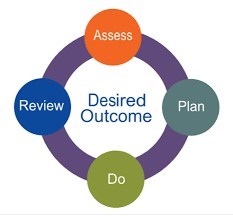SEN Support
SEN support in school
Most children and young people with SEN will be able to have their needs met in a mainstream school. Schools should adapt their approach and provide a personalised curriculum that is differentiated and that identifies any additional targeted support and intervention. This is called SEN support. Shropshire Provision for SEND - A Guide for Mainstream Schools provides further information about the support that schools can put in place to meet the special educational needs of children across all four areas of need.
Your school may suggest a meeting to write a 'one page profile' for your child. This will help everyone working with your child to learn about their special educational needs, their strengths and how to support your child. You may also want to write a one page profile with your child to share with others. This could include clubs or classes that your child attends outside of school.
Please take a look at our 'What is SEN Support' leaflet for more information.
Every school is required to identify and address the special educational needs (SEN) of the children or young people they support. They should have a clear approach to identifying and responding to any identified additional needs.
Where concerns are raised that a child may be not making expected progress in their learning, schools are required to intervene early to implement appropriate and effective support to overcome the barriers to learning. This SEN Support should take the form of a four-part cycle to develop a growing understanding of the pupils’ needs, and identify what support is required to ensure the pupil secures good outcomes and makes good progress. This is known as the ‘Graduated Approach’.
The Graduated Approach
The four stages are:

- Assess – A thorough and holistic assessment is essential to ensure that the ‘needs’ are accurately identified to ensure that the most appropriate and effective interventions are implemented. Assessments may be carried out by school staff (eg Dyslexia, Early Help – ‘Family Webstar’) or may involve external agencies (educational psychologists, specialist outreach support, Sensory Inclusion Service)
- Plan – Once the key barriers to learning have been identified it is possible to plan the most effective interventions. The teacher and SENCo should agree, in consultation with the parent and the pupil, the adjustments, interventions and support to be put in place. All teachers and support staff who work with the pupil should be aware of their needs, the outcomes sought, the support provided and any teaching strategies or approaches that are required
- Do – The class or subject teacher should remain responsible for working with the child on a daily basis. Where the interventions involve group or 1:1 teaching away from the main class or subject teacher, they should still retain responsibility for the pupil. They should work closely with any TAs to plan and assess the impact of support and interventions and how they can be linked to classroom teaching. The SENCo should support the class teacher and provide advice on the effective implementation of support
- Review – The impact and quality of the support and interventions should be evaluated, along with the views of the parent and child. The class teacher, working with the SENCo, should revise the support in light of the pupil’s progress and development.